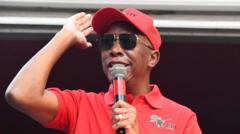In a notable political move, the Home Office in the UK has banned Julius Malema, a prominent South African politician, from entering the country due to his radical views deemed "non-conducive to the public good." This decision comes in light of Malema's open support for Hamas, particularly after the events of October 7, where he declared his party's intent to arm the group should they gain power. The UK government highlighted Malema's threatening rhetoric, including calls for violence against white South Africans and a history of inflammatory speeches.
Malema, who leads the Economic Freedom Fighters (EFF), a political party that finished fourth in the last South African elections, criticized the ban as an act of "cowardice" that undermines democratic dialogue. The restriction marks the second time within two months that Malema has been denied entry to the UK, the previous attempt thwarted due to a late application submission, and this time attributed to substantial concerns about his public statements and influence.
Compounding the controversy, a British official noted that this decision does not afford Malema any right of appeal and sets a precedent for future applications. The case has drawn parallels with broader discussions about free speech and political asylum, particularly as Malema's rhetoric has gained international attention, including feature time during a recent visit by South African President Cyril Ramaphosa to the White House with former President Donald Trump highlighting his statements. As global scrutiny around race relations and freedom of speech continues to intensify, this situation reflects the complexities of political narratives both in South Africa and abroad.













